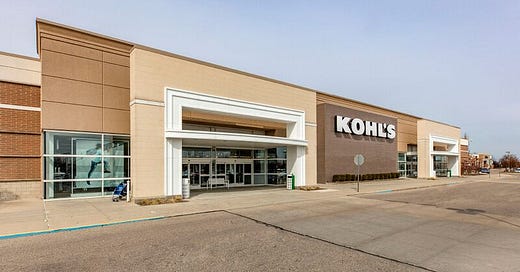Real Estate Is Not Kohl's Problem
Kohl's is closing 27 stores -- but the vast majority of its stores are profitable and many of the closing stores have already been leased to other retailers or are being readied for adaptive reuse
On yesterday’s Q4 2024 earnings call Kohl’s KSS 0.00%↑ affirmed plans to close 27 stores by April as new management attempts a turnaround.
But real estate is not one of the retailer’s problems.
Kohl’s CFO Jill Timm referred to the planned store closures as "hygiene" and something that Kohl’s “should be doing at all time" to cull underperformers from its base of ~1,100+ stores.
But Timm does not expect further widespread closures as the “vast majority” of Kohl’s stores generate a 4 wall profit.
In fact she even hinted at future rollouts of smaller stores that might fit well in rural and tertiary markets — such as 35,000 and 55,000 square foot stores rather than its standard ~80,000+ square foot prototype.
Of course some real estate does not make sense for Kohl’s — or even others — to utilize in the short or long term.
For instance 4 of the 27 stores slated for closure are attached to regional malls — including two “dead” malls in Ohio and Illinois where Kohl’s was the last remaining store and demolition is planned.
But demand has been quite strong from replacement users for other properties that Kohl’s is vacating.
And some of this real estate has already been leased or sold to other tenants and users — even before Kohl's vacated!
Over 80% of Kohl’s stores are ~80,000 - 100,000 square foot buildings located in outdoor strip centers.
~13% of Kohl’s stores are freestanding buildings and just 5% are located in regional malls.
The 27 stores slated for closure represent a mix of these formats:
4 of the closing stores are freestanding buildings that are not attached to malls or shopping centers (and well suited for non-retail repurpose options). Like the freestanding Kohl’s building in Stoughton, MA was advertised last year as available for a potential retail, industrial or storage reuse — even as the retailer continued to operate. It sold last month for ~$18.5 MM to CJ Shaughnessy Crane, a mobile crane service operator that plans to use it for warehousing and storage once Kohl’s vacates.
Other soon-to-be-vacated Kohl’s sites have long been set for redevelopment. Such as the Kohl’s store in Mountain View, CA that sold for $155 MM in 2019 to the Los Altos, CA School District. The district finished its capital raise for the school campus after voters approved a $350 MM bond in November. Now The Kohl’s store and adjacent buildings are to be demolished and the site redeveloped into a new campus for the Bullis Charter School with classrooms, parking and a four acre park with a track, soccer fields and a baseball diamond that will be available to area residents.
Similarly the Kohl’s in downtown Napa, CA that is set to close this Spring has long been targeted for redevelopment. Zapolski Real Estate purchased the Kohl’s building in 2015 and systematically acquired adjacent buildings and even a city owned parking lot to pave the way for a proposed $250 MM+ redevelopment of the site. But in 2022 it sold the property to a development group that now plans to demolish the Kohl’s building and replace it with ~15,000 square feet of retail space, 77 condos and a 165 room hotel.
Many of the soon-to-be-vacated Kohl’s stores are likely to remain as a retail use — and some were leased well before Kohl’s closed. For instance, the German grocer Lidl has purportedly leased the ~100,000 square foot soon-to-be-vacant Kohl’s building in Herndon, VA. Lidl does not even intend to occupy the entire store but instead plans to divide the building into three separate units. Lidl then plans to operate a grocery store in the middle ~30,000 square foot suite and lease the two endcap spaces to other tenants.
To be sure, the sale or re-tenanting of the leased locations that Kohls is set to vacate does not provide financial benefit to the Company.
Several of the sites are also in "one-of-a-kind" locations that offer uniquely lucrative redevelopment opportunities.
But the high prices paid to acquire the sites that Kohl's is vacating offer an interesting window to the potential value of its real estate portfolio (as Kohl’s owns ~35% of its stores).
Plus the profits generated by the bulk of the remaining Kohl's store fleet in its current form offer hope for the retailer as it pursues an operational turnaround.
One thing, however, appears pretty clear:
Real estate is not Kohl’s problem.








